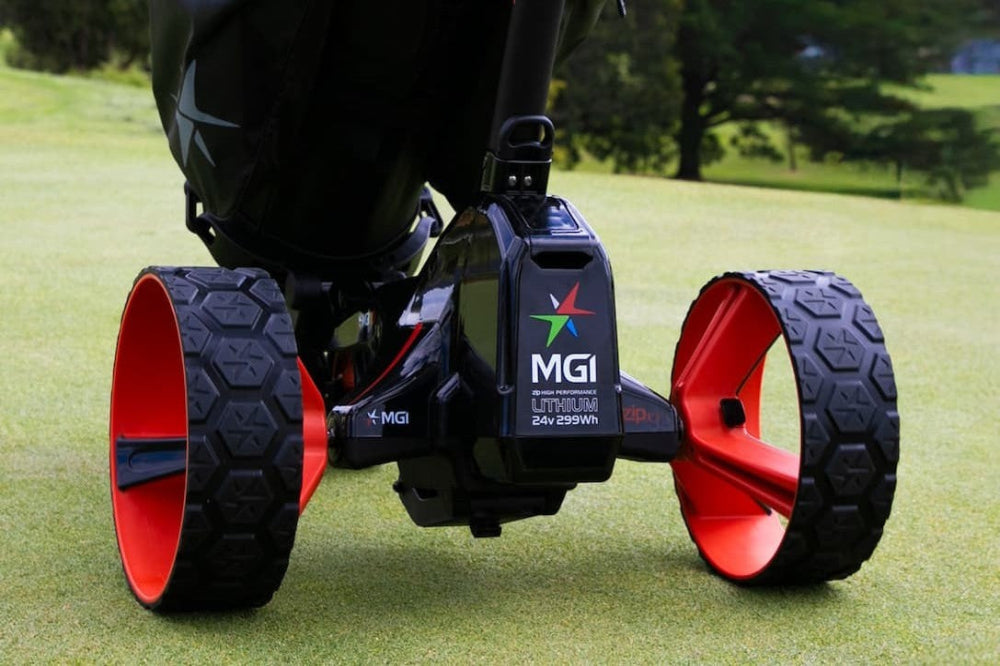Proper maintenance techniques can be hard to find when it comes to a product as new to the game as an electric buggy. It’s important to know what’s crucial to the lifespan of your buggy before getting started, and luckily, we’ve got all the golf buggy tips and tricks of maintenance right here to help out.
With a little diligence and a healthy dose of insight from the experts, we can lift a weight off of your shoulders for years to come.
What to Know About Cleaning Your Electric Golf Buggy
Exterior Cleaning Tips
With a lithium battery powering the buggy itself, improper cleaning habits can spell disaster. As you clean the exterior of your electric buggy, under no circumstances should you use a pressure washer or hose. MGI recommends cleaning away excess debris with a brush and wiping the buggy down with a damp cloth.
If soap is required to remove caked-on mud or debris, use it minimally and avoid contact with your lithium battery at all times. The surface of the buggy is smooth and should be receptive to minimal pressure when cleaning.
Interior Maintenance
When cleaning the interior of your electric buggy, the same rules apply. Do not under any circumstances use a power washer. Excess moisture reaching the electronic components of the device could leave it unusable. If dirt, mud, or grass accumulates along the inner frame of your electric buggy, use a golf tee to pick away debris before wiping down the entire frame with a damp towel.
It could prove beneficial to re-lubricate your buggy’s moving parts following a deep clean to ensure it runs smoothly, but that is left up to your discretion.
Maximising the Battery Life of your Electric Golf Buggy
Lithium batteries have become one of the most popular means of power in the world, and as we learn more and more about them, we find the safest and most effective ways to maintain them are not as complex as you may think. These lithium batteries have a very low self-discharge rate — meaning they retain power when not in use.
They are also more environmentally friendly than older models, with fewer harmful chemicals and increased longevity. With the right technique, you can maximise your lithium batteries lifespan and stay on the course stress-free.
We recommend cleaning away excess dirt or debris with a brush and wiping down the battery casing. While it is okay to wipe down your buggy with a damp cloth following play, we want to reiterate that under no circumstances should you clean your buggy or battery using a pressure washer, tap or hose.
When connecting your battery to the charger, make sure that the power connection has no faults and do not use power boards and extension leads. While you may not have used an entire charge on the course, the battery must be fully charged after every use. We recommend keeping your charger and device at an ambient temperature between 41 and 86℉. It is also recommended to leave your battery connected to its charger for no longer than ten hours.
Routine Checks Ensure Longevity for your Electric Buggy
While we do recommend cleaning your electric buggy regularly, your MGI lithium battery leads, casing and connections must be regularly inspected for damage and wear. It is recommended to service your buggy every 12 months or every 310 miles to ensure optimal performance.
Do not use your battery if you notice worn or damaged connections — as these imperfections can cause dangerous battery fires. If you notice any damage or wear on the battery lead, casing, and connections, please contact MGI or an Authorised MGI Service Centre for inspection and a potential repair or replacement.
Best Practices for Storage
Battery care doesn’t stop when the season is over. MGI engineers urge users to be aware of the surroundings where you charge or store your battery. When storing or charging your lithium battery, keep it clear of items like heaters, radiators, and air conditioners. While these items often produce heat, please remember that water is the ultimate enemy of a lithium battery. Your battery should not be within reach of rain or water of any sort.
Quick Fixes for Common Electric Golf Buggy Problems
Even in this day and age of incredible technology, you will likely run into problems from time to time. Do not panic — correcting issues on the fly can be easier than you think. As we just mentioned, water is the enemy of a lithium battery. Any issues that you feel could be due to water damage should be handled delicately, and we recommend turning your electric buggy off and keeping it out of use until a professional has had an opportunity to diagnose the issue.
Aside from water damage, you can perform small troubleshooting fixes on your own. For example, we find that users frequently get stuck on the “searching for courses” screen or the satellite is struggling to get a signal. If this is the case for you, move to an outdoor location away from buildings with a clear line of sight to the sky. To get a satellite signal, your electric buggy must be in open sky with no obstructions.
If your electric buggy seems to be running slower than usual, don’t lose sleep over it. This is another fairly common problem our users run into. Simply check your wheels to ensure the left wheel is on the left side and the right is on the right. During assembly or partial reconstruction following a deep clean, it’s easy to get the two mixed up.
If your buggy seems to get slower as the game progresses, your battery and charger need to be inspected by an authorised MGI repair center.
On that note, almost any battery or charger malfunction should be left up to the experts. Things like your charger not lighting up upon connection or failing to provide power can be easily fixed by an authorised MGI repair technician. In the event of an issue you aren’t sure what to do to fix, contact our support team or visit the FAQs page to see if we can help out.
MGI Electric Golf Buggies Can Take Your Game from Good to Great
Taking good care of your MGI Electric Golf Buggy will ensure it serves you well for years. Regular cleaning, mindful battery care, and routine checks will keep your buggy in top shape.
When you’re preparing for golf buggy maintenance, remember these big takeaways — avoid pressure washers, keep the battery dry and cool, inspect your buggy frequently, and seek professional help if you find yourself in a place of uncertainty. By following these simple guidelines, you can enjoy a smooth and reliable golfing experience with your MGI buggy, round after round.

